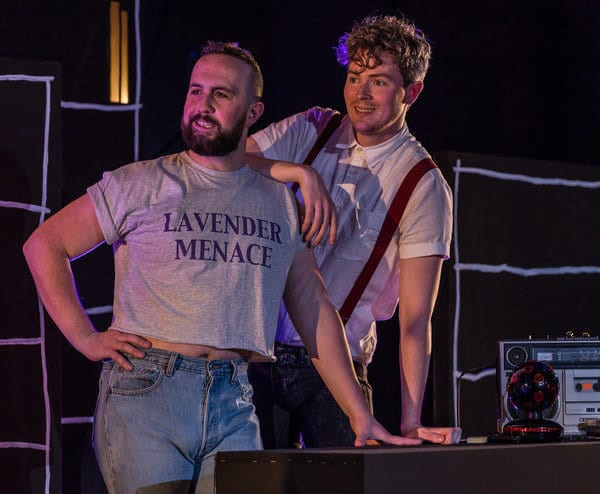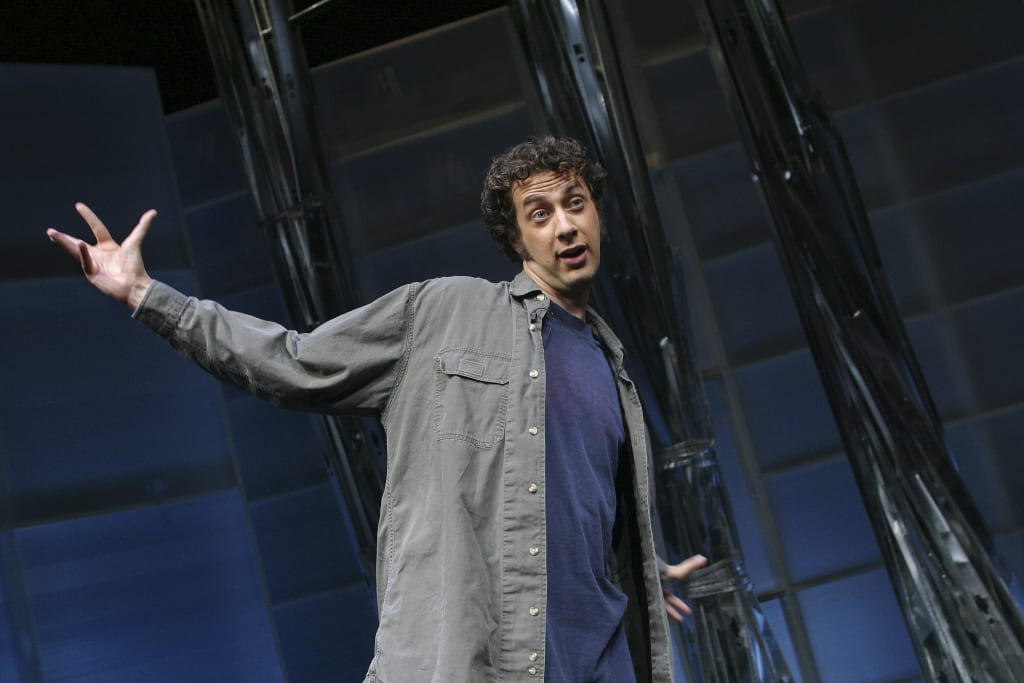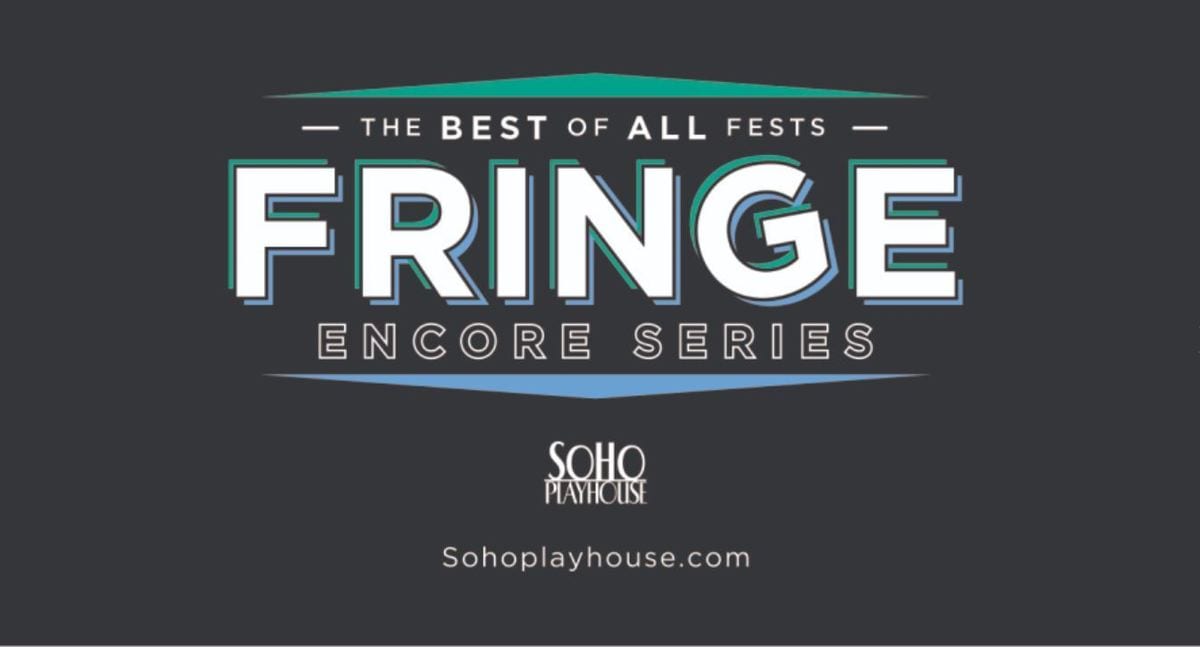Theater in its very nature is an artifice, a show, a construction brought together for various purposes. This year’s Soho Fringe Encore Series confronts this artifice head-on with several very stylized pieces, specifically (auto)biographical in nature, that use this very artifice in order to reveal something about the performer, creator, and potentially the audience or the world around us. The Soho Fringe Encore Series presents an encore of the best of the best shows from Fringe Festivals from around the world and gives them a chance to be seen in New York City on the Soho Playhouse stage. In 2018, these international festivals included Limerick, Brighton, Orlando, Hollywood, Toronto, New York and Edinburg. The winner of the Outstanding Production of the Year aware will receive a full Off-Broadway run in New York City, truly acting as a stepping stone for emerging talent around the world.
My run with the Encore Series began with an LGBT comedy, Love Song to Lavender Menace. Lavender Menace is a mesh of meta-storytelling, with duo Lewis (Pierce Reid) and Glen (Matthew McVarish) preparing an ‘homage’ to the founders of the infamous underground LBGT book store, Lavender Menace on its the final night. Interspersed between the duos present-day dialogue and pantomime-like retelling of the past, is a film noir monologue of a married man who dares to wander past the daring bookstore which the writer is taking the time to rewrite and redraft. What is lovely about this piece is the sense that you are peering in on two friends with inside jokes who are genuinely trying to figure the homage and their relationship out. Enmeshed in the nature of the bookstore and the party and sex-filled adventures of the pair are questions of the relationship between literature and censorship and how political activism or assimilation can affect communities, specifically LGBT. Normally when a show literally spells out its theme and the questions it’s addressing through analysis of literature, I would consider it condescending to the audience. However, the literature and novels the show addresses would probably be obscure to most mainstream audiences, and so instead I found it fascinating, almost like a live book report on a subsection of literature hidden from my view. The show struggles a bit with its pacing and the cohesion of its storytelling, which is partly the fault of the script and partly the fault of audio issues with the tech. But using varied, occasionally almost drag like, storytelling methods in order to tell the story of the culture that generated the forms themselves proves a doubled insight into differences of opinions on assimilation, sexuality, and the creation, maintenance, and adaptation of an identity.

In Martin Dockery’s Inescapable, we see a Meisner game taken to the extreme. Two friends (Dockery and Jon Paterson) are hiding away in the kitchen during one of their holiday parties. On the table is a mysterious object which we cannot see, but they are sure, somehow, could be dangerous to touch. There is something written on it too, a warning from their future selves? As the friends debate whether or not to touch the box, where it came from, and why it is there, they also begin to question each other, what they know about their friendship and how they really feel about one another. As they unknowingly repeat the same conversation, again and again, new meanings are brought to life. The performers never drop a beat, never miss a note, and push through the cycles of repetition with such dexterity and intensity I wondered when they were going to have a chance to breathe. The conceit of the story is a gimmick, what would happen if you were stuck repeating the same moment over and over again; however, the show does not remain a clever exercise. Instead, it is a fast-paced devastation of a relationship that shows us what would we say to one another if pushed and if we knew it was going to be erased from our memories anyway. Though the emotions that carry over even when the words are forgotten clearly show that no erasure is ever quite complete.
TJ Dawes: A Canadian Bartender at Butlins also plays with circular and linear time, crafting TJ’s autobiographical storytelling to weave in and out of time and place. TJ enters the stage to tell the story of his summer working as a bartender at a monotonous institution of a British holiday camp. And yet he starts his show telling the story, on ‘request’, of a teenage adventure he had with his friends at his family’s cabin on an island off of Canada one winter. The rest of this show follows this pattern, going off on tangents of thoughts and memories as though he was truly telling this story and allowing himself to become distracted. While Inescapable is an exercise of time and repetition, TJ Dawes looks at the meandering thought processes of the mind. This exploration of a thought process connects these previous three shows, how the mind creates and remembers, how the mind forgets but the soul remembers, and how the mind makes connections, imbuing mundane moments in our lives with meaning.

Now if you’re looking for a relatable autobiographical musical adventure, Tamar Broadbent: Best Life is everything. From Instagram to dating to choosing avocado toast over a mortgage, Tamar uses the pop sounds and tumbler humor of her generation in order to fight back against the tiring assault on the irresponsible, world-ruining millennials. Tamar is charming and quick-witted; her delivery is very natural, as though she is truly engaging and responding to the current audience, though the well-thought-out lyrics and comedic beats of her work belies the carefully honed set. Like another cabaret-style show I will talk about, Tamar also makes use of the voice of g-d voiceover, for her in the form of her 90-year-old grandmother. This blend of technology and cross-generational dialogue, despite being one of the more staged elements of her piece, grounds her wit in something relatable to all members of the audience. Hopefully, we can keep this rising star on this side of the Atlantic.
My one slight blip in an otherwise very successful experience with Soho Encore Series is the adaptation of the classic horror story, Dr Jekyll and Mr Hyde. The production leans heavily into a stylized theater form, the minimalistic, multi-character played by a single actor slapstick that was made so iconic in The 39 Steps. Taking a classic story and giving it a new twist by filtering it through the lens of now relatively common theatrical form is not the most interesting way to have a new take on a story. The issue this production hits is not that the actors are not dexterous enough to pull this off, but they are handed rather weak material to do so. The attempts at humor are cloying and cliché. However, when the drive to make the audience laugh disappears and instead we get a look at the story of Jekyll and Hyde – a man’s descent into madness of his own creation, the loyalty one can feel for another person, and the technical creation of tension using lighting, minimal sets, and the actor’s pacing there is something truly rewarding to watch. The show redeems itself in my eyes for its final third as it stops trying to be a comedy and delves into the horrors of humanity using physicality and costuming.
Sticking with biographical storytelling, Dietrich: Natural Duty slams into me as the most delightfully unexpected surprise of the festival. In the style of a 40s cabaret show, Peter Groom dons wig, makeup, and a glamorous silver dress to portray the famous German film star Marlene Dietrich as she weaves in and out of an interview with a voice over the journalist who interrupts her performance. Dietrich drawls some innuendos and gives the audience classic cabaret patter. But the show ends up portraying more than just a Hollywood veneer. Dietrich’s heart breaks for the soldiers she travels with during the war. She epitomizes the stalwartly nature of her German heritage, the difficulties of having to prove herself to Americans while being rejected by her home country, and the horrible choice she had to make to encourage the sale of war bonds that would be used to create bombs that would potentially land in the city where her mother still lived. She follows this with a haunting rendition of “Where Have All the Flowers Gone?” which gains a deeper perspective because of the picture of the war camps, filled with cold and disease and death. At the top of the show, Dietrich becomes annoyed with her interviewer’s probing questions about herself and her family. So, she rejects him by describing all the various steps it takes to put Marlene Dietrich into place and rhetorically telling the audience that they “don’t want to watch her take her a part”. A step further than the exploration of self, this show not only dives into the biographical by revealing a vulnerability of a star again using a stylized art form, the cabaret but also turns its gaze onto the audience. Our desire for illusion versus reality. She points out that this is true both of other people’s belief of the afterlife and of the spectacle of the glamour of Hollywood. Marlene breaks down what Hollywood is to her: a job. She goes in, she follows directions, and she leaves. It is the German in her, that desire for obedience. Only Hitler took that German inclination for obedience too far. The close connection between the obedience of Hollywood, the American desire for an illusion to follow, and Hitler makes it hard not to weave a line of fear between the three. I called this show an unexpected surprise because while I expected it might make me laugh, I had no idea it would also make me cry. A beautiful tribute to a star who was more than just beautiful.

